Politics
China test-fires intercontinental ballistic missile into Pacific Ocean as tensions with US mount
Published
4 months agoon
By
Ekwutos BlogChina test-fired an intercontinental ballistic missile into the Pacific Ocean on Wednesday, stirring security concerns in a region already tense over Beijing’s territorial claims and rivalry with the US.
The missile carried a dummy warhead and fell into a designated area of the sea, the Defence Ministry said in a statement posted to social media.
The ministry insisted that the launch by the People’s Liberation Army’s Rocket Force was part of routine annual training, complied with international law and was not directed against any country or target.
A map published in Chinese newspapers at the time showed the target area as roughly a circle in the centre of a ring formed by the Solomon Islands, Nauru, the Gilbert Islands, Tuvalu, western Samoa, Fiji and the New Hebrides.
The US and non-governmental organisations have previously said China is building up its array of missile silos, but it’s unclear how many missiles and nuclear warheads it has actually added to its arsenal.
The US remains China’s main global rival, although Japan, Taiwan, the Philippines and others have territorial disputes with Beijing that occasionally threaten to develop into military clashes.
Despite its desire to achieve regional military hegemony, China maintains a “no first use” nuclear weapons policy, and tests of China’s intercontinental ballistic missiles in international waters are rare.
Experts and a historical survey of China’s program by the Washington-based Nuclear Threat Initiative suggest the last occurred in May 1980. That test saw China launch its DF-5 missile into the South Pacific.
According to James Acton, the co-director of the Nuclear Policy Program and a senior fellow at the Carnegie Endowment for International Peace, China typically launches missiles toward its western deserts from its east coast. The fact that China launched a test that splashed down in international waters was unusual, he said, but mirrors testing that the US does for its own ballistic missile fleet.

Visitors tour past Chinese military vehicles carrying the Dong Feng 41 and DF-17 ballistic missiles at an exhibition in Beijing. Andy Wong/Copyright 2022 The AP. All rights reserved
“When they haven’t done something for 44 years and then they do it, that’s significant,” Acton told The Associated Press. “It’s China’s way of telling us, ‘Like you, we’re not ashamed we have nuclear weapons and we’re going to behave like a great nuclear power’.”
Offensive and defensive
A series of corruption arrests in China this year ensnared several leading officers in the Rocket Force, and two previous defence ministers have been detained over allegations of misconduct.
A test launch now could both provide assurances to China’s population, who are facing an economic downtown, and a signal to the world that the Chinese Communist Party remains firmly in control and is determined to rise to global prominence.
Meanwhile, tensions remain high over Taiwan and with the Philippines, where the US Army has deployed its new mid-range missile system, known as Typhon.
On Wednesday, two Filipino officials said the US and the Philippines have agreed to keep the system there indefinitely to deter China.
“I don’t know what’s the plan, but if I were to be followed, if I were given the choice, I would like to have the Typhon here in the Philippines forever because we need it for our defence,” said General Romeo Brawner Jr, the head of the Philippines’ military.
Defence officials in Japan and Taiwan declined to comment directly on the Chinese announcement. Both, along with South Korea, maintain robust defences against Chinese moves, including early warning systems and air raid shelters.
You may like


Renowned Comedian Alibaba’s Spouse Shares Enchanting Snap of Their Trio of Bundles of Joy to Commemorate Their First Year of Life


Victor Osimhen Responds to Allegations of Assaulting Turkish Journalist
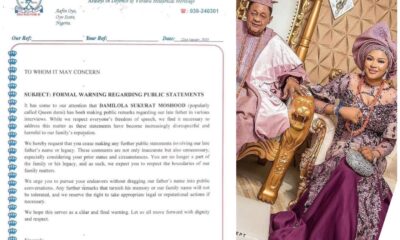

Stop dragging our father’s name into public conversations- late Alaafin of Oyo’s children threaten legal action against Queen Dami
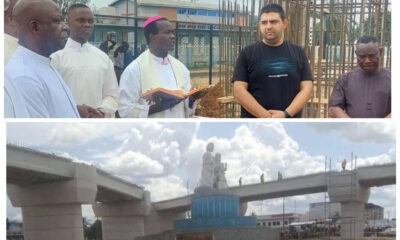

ASSUMPTA FLYOVER: CAN URGES RELIGIOUS AND COPORATE BODIES TO COOPERATE WITH IMO GOVT
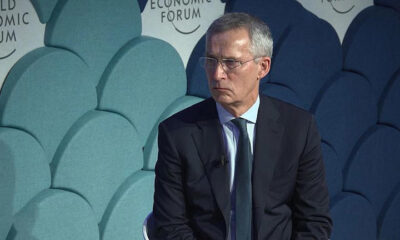

Ending Russia’s war in Ukraine this year is possible, says ex-NATO chief Stoltenberg
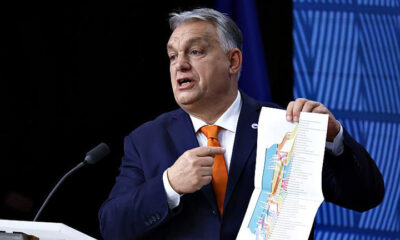

‘Playing with fire’: Orbán’s sanctions veto threat puts Brussels on edge
Politics
‘Playing with fire’: Orbán’s sanctions veto threat puts Brussels on edge
Published
6 hours agoon
January 24, 2025By
Ekwutos Blog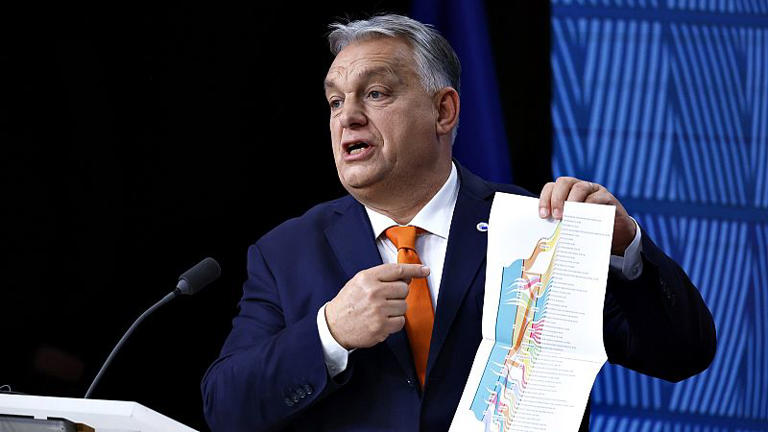
Diplomats and officials in Brussels are holding their breath as they wait to find out if Viktor Orbán’s increasingly critical rhetoric against EU sanctions will translate into a veto that could upend the bloc’s Russia policy, as soon as next week.
Since February 2022, the bloc has brought in sweeping bans on trade with Russia in energy, technology, finance, luxury goods, transport and broadcasting, among others. It’s also frozen €210 billion assets held by the Russian central bank within the bloc, which have been used to back a multi-billion-euro loan for Kyiv.
Those could all soon be put into question. The restrictions, designed to cripple Moscow’s ability to finance its full-scale invasion of Ukraine, need to be prolonged every six months by unanimity, and the next deadline is 31 January.
In recent days, Orbán and his deputies have ratcheted up their harsh words against the sanctions regime, arguing the inauguration of US President Donald Trump, who wants to negotiate with Russia’s Vladimir Putin, requires the bloc to rethink its longstanding stance.
“The question of extending the sanctions is now on the agenda, and I pulled the handbrake and asked European leaders to understand that this cannot be continued,” the Hungarian Prime Minister said in a radio interview on Friday morning.
One of his ministers, Gergely Gulyás, has openly questioned the six-monthly renewal. “So far, everyone has seen the extension of sanctions as automatic, but we do not think it is automatic now,” Gulyás said on Thursday.
Those comments have stoked fears that Hungary will use its veto to block the rollover, triggering the collapse of a sanctions regime painstakingly built across 15 packages, and depriving the EU of its most hard-hitting tool against the Kremlin.
“It’s clear that if Budapest were to block, we would have a great issue at hand,” said a senior diplomat, who spoke on condition of anonymity due to the sensitivity of the matter. “Budapest is playing with fire.”
The diplomat described the political situation as “mind-blowing” given the dire battleground conditions faced by Ukrainian forces, and predicted the EU would plunge into “uncharted territory” were sectoral sanctions to collapse overnight.
“The shenanigans we get from Budapest are seemingly endless,” the diplomat said.
A closed-door discussion among ambassadors on Friday only increased the uncertainty, as the Hungarian representative maintained ambiguity over his position, several diplomats said.
Instead, Hungary asked to change the agenda of Monday’s meeting of foreign affairs ministers, to allow the item on sanctions renewal, which is generally approved without any fuss, to be openly debated after a separate discussion on Ukraine support.
The Hungarian envoy also made a number of requests concerning energy policy, and in particular Ukraine’s recent decision to terminate the transit of Russian gas through Hungary, another diplomat said.
The decision, taken by President Volodymyr Zelenskyy to stop Moscow from earning “additional billions on our blood,” has met with a furious reaction from Hungary and Slovakia, two landlocked countries that still purchase Russian fossil fuels. Earlier this month, Slovak Prime Minister Robert Fico threatened to use his veto power in retaliation.
‘Transactional’ diplomacy
In his radio interview, Orbán made a direct link between sanctions renewal and the gas dispute, and asked the European Commission to intervene in his country’s favour.
The Commission has said it has “no interest” in extending the transit of Russian gas.
“What is closed now, has to be reopened again. This is not a matter for Ukraine, it is an issue for Europe, an issue for central Europe,” the prime minister said.
“If the Ukrainians want help, for example sanctioning the Russians, then let’s reopen the gas transit routes and allow the central European countries, including Hungary, to receive the gas we need through Ukraine.”
The connection between the two issues has left diplomats scratching their heads, trying to figure out how severe the latest threat actually is. Orbán has previously used his veto to extract concessions, but never to provoke such a disruptive effect on sanctions.
“The threats are taken seriously. But it’s not the first time,” a diplomat said, decrying Hungary’s “transactional” manner of making demands.
“The EU cannot enter into panic mode every time somebody says something in Budapest,” they added. “We have learned to make a clear distinction between what we hear in Budapest and what happens in Brussels.”
The suspense is likely to last, at least, until foreign affairs ministers meet on Monday and Hungary’s representative, Péter Szijjártó, announces his country’s position. Diplomats speculate that, despite the harsh talk, Szijjártó will back down if he can secure new EU assistance for Hungary’s energy needs.
This will pave the way for the renewal to be approved, if not on Monday, then at least before the end of the month.
“We expect a positive result from that discussion. [Sanctions] are a key part of our strategy,” said a high-ranking EU official. The issue of gas transit has “nothing to do with sanctions on Russia. Sanctions on Russia are because of the aggression.”
Asked if Brussels was already drafting a Plan B, the official said: “We don’t envisage any other possibility than that it will be approved in the coming days.”
One factor certain to influence the discussion are the latest comments made by Donald Trump, who took some observers by surprise with hawkish comments against Russia.
“If we don’t make a deal, and soon, I have no other choice but to put high levels of taxes, tariffs, and sanctions on anything being sold by Russia to the United States, and various other participating countries,” Trump said.
“We can do it the easy way, or the hard way – and the easy way is always better.”
The EU is already preparing a 16th package of sanctions against Russia, with the view to approving them before the third anniversary of the invasion, in late February.
Politics
Donald Trump To Reduce Oil Prices Worldwide
Published
8 hours agoon
January 24, 2025By
Ekwutos Blog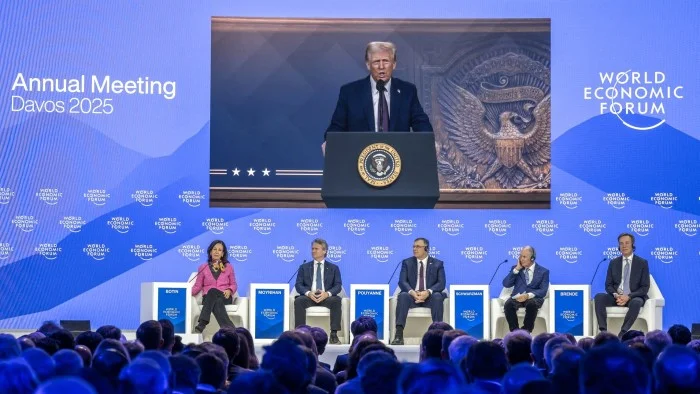
Donald Trump has reportedly urged Opec and Saudi Arabia to lower global oil prices and called for central banks worldwide to reduce interest rates immediately after.
Speaking to business leaders in Davos on Thursday, the former US president criticized oil producers for not acting sooner to reduce crude oil costs.
“I’m going to ask Saudi Arabia and Opec to bring down the cost of oil. You gotta bring it down. Frankly, I’m surprised they didn’t do it before the election,”Trump said.
He suggested that lowering oil prices could help stop Russia’s war in Ukraine, saying,
“Right now, the price is high enough that the war will continue. Bring it down, and you could end that war.”
Trump also encouraged global companies to manufacture their products in the US, warning them of heavy tariffs if they import goods into the American market.
He promoted his economic policies, including large tax cuts and reduced regulations, describing them as a “revolution of common sense.”
This is an ongoing story.
Politics
President Bola Ahmed Tinubu has appointed board chairpersons for 42 federal organisations and a secretary to the board of the Civil Defence, Immigration, and Prisons Services.
Published
11 hours agoon
January 24, 2025By
Ekwutos Blog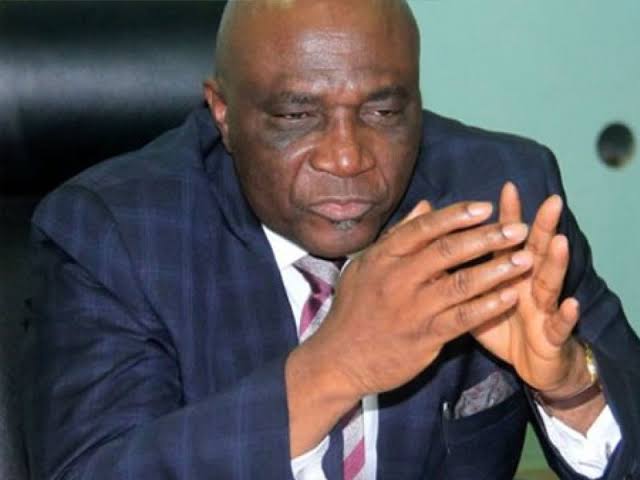
STATE HOUSE PRESS RELEASE
APPOINTMENT OF BOARD CHAIRPERSONS AND CEOS
President Bola Ahmed Tinubu has appointed board chairpersons for 42 federal organisations and a secretary to the board of the Civil Defence, Immigration, and Prisons Services.
The President has also appointed a new managing director for the Nigerian Railway Corporation and a director-general for the National Board for Technology Incubation (NBTI).
President Tinubu directs the board chairpersons not to interfere with the management of the organisations, emphasising that their positions are non-executive.
All the appointments take immediate effect.
1. NATIONAL YOUTH SERVICE CORPS, MINISTRY OF YOUTH DEVELOPMENT
– Hon. Hillard Eta Chairman (Cross River)
2. NIGERIAN INSTITUTE OF INTERNATIONAL AFFAIRS
– Prof. Bolaji Akinyemi, Chairman (Lagos)
3. FEDERAL AIRPORT AUTHORITY OF NIGERIA, MINISTRY OF AVIATION
– H. E. Abdullahi U. Ganduje, Chairman (Kano)
4. NATIONAL SUGAR DEVELOPMENT COUNCIL
– Sen. Surajudeen Bashiru Ajibola, Chairman (Osun)
5. NIGERIA BULK ELECTRICITY TRADING COMPANY
– H. E. Sulaiman Argungu, Chairman (Kebbi)
6. NATIONAL AGENCY FOR GREAT GREEN WALL
– Sen. Magnus Abe, Chairman (Rivers)
7. NATIONAL TEACHERS INSTITUTE
– Barr. Festus Fuanter, Chairman (Plateau)
8. NATIONAL BOARD FOR TECHNOLOGY INCUBATION (NBTI)
– Raji, Kazeem Kolawole, Director-General (Oyo)
9. NIGERIAN INSTITUTE OF EDUCATIONAL PLANNING AND ADMINISTRATION
– Chief Victor Tombari Giadom, Chairman (Rivers)
10. TEACHERS REGISTRATION COUNCIL OF NIGERIA
– Comrade Mustapha Salihu, Chairman (Adamawa)
11. INDUSTRIAL TRAINING FUND
– Hon. Hamma Adama Ali Kumo, Chairman (Gombe)
12. NIGERIAN INSTITUTE OF SCIENCE LABORATORY TECHNOLOGY
– Donatus Enyinnah Nwankpa, Chairman (Abia)
13. SHEDA SCIENCE AND TECHNOLOGY COMPLEX
– Sen. Abubakar Maikafi, Chairman (Bauchi)
14. FEDERAL MORTGAGE BANK OF NIGERIA
– H. E. Nasiru Gawuna, Chairman (Kano)
15. NATIONAL OFFICE FOR TECHNOLOGY ACQUISITION AND PROMOTION
– Sen. Tokunbo Afikuyomi, Chairman (Lagos)
16. NIGERIAN POSTAL SERVICE
– Chief D. J. Kekemeke, Chairman (Ondo)
17. NATIONAL INLAND WATERWAYS AUTHORITY
– Hon. Musa Sarkin Adar, Chairman (Sokoto)
18. NATIONAL STEEL COUNCIL
– Prof. Abdulkarim Kana Abubakar, Chairman (Nasarawa)
19. NATIONAL ENVIRONMENTAL STANDARDS AND REGULATIONS
ENFORCEMENT AGENCY
– Hon. Garba Datti Muhammad, Chairman (Kaduna)
20. NATIONAL BIO-SAFETY MANAGEMENT AGENCY
– Mu’azu Bawa Rijau, Chairman (Niger)
21. NIGERIAN BUILDING AND ROAD RESEARCH INSTITUTE
– Hon. Durosimi Meseko, Chairman (Kogi)
22. FEDERAL TEACHING HOSPITAL, GOMBE
– Hajia Zainab A. Ibrahim, Chairman (Taraba)
23. NIGERIAN RAILWAY CORPORATION
– Dr.Kayode Isiak Opeifa, Managing Director (Lagos)
24. FEDERAL TEACHING HOSPITAL, IDO-EKITI
– Aare (Hon.) Durotolu Oyebode Bankole, Chairman (Ogun)
25. FEDERAL MEDICAL CENTRE, ABEOKUTA
– Mr Abdullahi Dayo Israel, Chairman (Lagos)
26. FEDERAL MEDICAL CENTRE, ASABA
– Dr. Mrs. Mary Alile Idele, Chairman (Edo)
27. FEDERAL MEDICAL CENTRE, LOKOJA
– Nze Chidi Duru (OON), Chairman (Anambra)
28. FEDERAL MEDICAL CENTRE, OWERRI
– Hon. Emma Eneukwu, Chairman (Enugu)
29. CIVIL DEFENCE, IMMIGRATION AND PRISONS SERVICES BOARD
– Major Gen. Jubril Abdulmalik Rtd, Secretary (Kano)
30. FEDERAL MEDICAL CENTRE, UMUAHIA
– Mr. Uguru Mathew Ofoke, Chairman (Ebonyi)
31. FEDERAL MEDICAL CENTRE, YENAGOA
– Barr. Felix Chukwumenoye Morka, Chairman (Delta)
32. FEDERAL MEDICAL CENTRE, YOLA
– Alh. Bashir Usman Gumel, Chairman (Jigawa)
33. DAVID UMAHI FEDERAL UNIVERSITY TEACHING HOSPITAL, UBUHU, EBONYI STATE
– Dr. Ijeoma Arodiogbu, Chairman (Imo)
34. NATIONAL OIL SPILL DETECTION AND RESPONSE AGENCY
– Chief Edward Omo-Erewa, Chairman (Edo)
35. NIGERIAN MARITIME ADMINISTRATION AND SAFETY AGENCY (NIMASA)
– Yusuf Hamisu Abubakar, Chairman (Kaduna)
36. NNAMDI AZIKIWE UNIVERSITY TEACHING HOSPITAL, NNEWI, ANAMBRA STATE
– Hon. Ali Bukar Dalori, Chairman (Borno)
37. AHMADU BELLO UNIVERSITY TEACHING HOSPITAL, SHIKA, ZARIA,
KADUNA STATE
– Hon. Lawal M. Liman (Chairman)
38. FEDERAL MEDICAL CENTRE KATSINA
– Dr. Abubakar Isa Maiha (Chairman)
39. RAW MATERIALS RESEARCH AND DEVELOPMENT COUNCIL (RMRDC)
– Isa Sadiq Achida, Chairman (Sokoto)
40. FEDERAL MEDICAL CENTRE BIRNIN KUDU
– Dr. Mohammed Gusau Hassan, Chairman Zamfara
41. NATIONAL BUILDING AND ROAD RESEARCH INSTITUTE
– Hon. Yahuza Ado Inuwa, Chairman (Nasarawa)
42. SOKOTO-RIMA RIVER BASIN DEVELOPMENT AUTHORITY
– Amb. Abubakar Shehu Wurno, Chairman (Sokoto)
43. AMINU KANO TEACHING HOSPITAL
– Augustine Chukwu Umahi, Chairman (Ebonyi)
44. FEDERAL SCHOLARSHIP BOARD
– Engr. Babatunde Fakoyede, Chairman (Ekiti)
45. NIGERIAN SOCIAL INSURANCE TRUST FUND
– Hon. Shola Olofin, Chairman (Ekiti)
Bayo Onanuga
Special Adviser to the President
(Information & Strategy)
January 23, 2025

Renowned Comedian Alibaba’s Spouse Shares Enchanting Snap of Their Trio of Bundles of Joy to Commemorate Their First Year of Life

Victor Osimhen Responds to Allegations of Assaulting Turkish Journalist

Stop dragging our father’s name into public conversations- late Alaafin of Oyo’s children threaten legal action against Queen Dami
Trending
- Politics11 months ago
Nigerian Senate passes Bill seeking the establishment of the South East Development Commission.

 Business11 months ago
Business11 months agoInflation hits record high of 29.90% on naira weakness

 Politics8 months ago
Politics8 months agoBREAKING: Federal Gov’t Offers To Pay Above N60,000, Reaches Agreement With Labour

 SportsNews11 months ago
SportsNews11 months agoOlympic Qualifiers 2024: CAF Confirms Dates For Super Falcons Vs Banyana Banyana

 Trending3 months ago
Trending3 months agoNYA demands release of ‘abducted’ Imo chairman, preaches good governance
- Business3 months ago
US court acquits Air Peace boss, slams Mayfield $4000 fine

 Politics3 months ago
Politics3 months agoMexico’s new president causes concern just weeks before the US elections
- Entertainment3 months ago
Bobrisky transferred from Immigration to FCID, spends night behind bars

